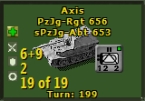Christolos
Posts: 953
Joined: 4/24/2014
From: Montreal, Canada
Status: offline

|
quote:
ORIGINAL: itkotw
It is kinda funny that everyone is describing how to destroy encircled, "out of supply" units by listing how to stack bonuses using many different unit types. The way everyone is talking you would think we were trying to destroy some sort of fortress hex. The even "funnier" thing is that encircled/"out of supply" units have the same supply as enemy units that are in supply, but are a few hexes from their supply source. The attack methods everyone is describing works better on "in supply" units that are a few hexes from their supply source. There needs to be night and day differences between surrounded and not-surrounded troops.
Troops that are surrounded in real life have a really hard time when you consider that size of the units we are using, corps and army. The supply needs of an army sized unit are HUGE and it is not just food and rifle bullets. Artillery and anti-tank shells (these units would have some "organic" artillery and AT units), vehicle parts and tires, medical services, the list is endless. There is no way an army sized unit would be considered "supplied" for months if they were encircled. If an army sized unit tried to fight at full intensity and not ration its artillery shells, I bet it would run out in a week. Remember we are just talking about city hexes and not fortresses or fortified hexes. Just an average city where an army decided to stop.
Not all city attacks are or were "sieges". Not every city is a fortress or even "fortified". Here are some rough dates for the historic capture of cities (quick internet searches are not the best, I know): Minsk - "On 26 June Minsk, the capital of Belarus, fell to the Wehrmacht"(Wikipedia), Smolensk - "However, when the Smolensk pocket was finally eliminated on 5th August the Soviet 16th, 19th and 20th armies within had ceased to exist, and another 309 000 POWs had been taken" (operationbarbarossa.net). So, the Minsk "pocket" was destroyed FOUR DAYS after the start of Barbarossa, and the Smolensk attack started on July 10 and ended August 5th, that is about 21 days to create AND destroy a "pocket" containing three armies. And we can assume that every pocket up to Smolensk was destroyed by that August 5th date, that is about 45 days after the start of Barbarossa, or about 4 game turns. Yes four game turns to take Smolensk.
Just off the cuff, I would say that units should not be able to reinforce in any way if they don't have a rail or port link back to the capital and supply should be reduced to one or two for city hexes. Another problem I have ran into is that if your units attack to reduce the entrenchment number, but receive damage, the enemy unit gets experience. If your attacks fail multiple times over the span of a few turns the enemy unit gains significantly more experience than your units. I think it would be better if the attacking units get experience for destroying entrenchment points equal to causing losses to strength points. So many of the attacks in game are done to reduce the entrenchment, but these attacks are not rewarded with much experience. If there were no other changes to the game other than the experience change, I would be happy.
I realize that many of the game mechanics are only there to create difficulty for the player. But we need to figure out a better way to create player difficulty without creating too many grossly ahistorical situations (I would call them "grossly ahistorical" because EVERY town in the game creates these hard to crack nuts). Remember that the game has to change to get better. The game will never get better by staying the same.
+1
What I also found hard to deal with is how hard it is to shatter surrounded units that are and have been at 0 supply level for many consecutive turns despite being at low readiness and moral...
Is there any way to tweak this with the editor or will this possible be addressed in terms of a balancing issue in the upcoming patch?
C
< Message edited by CC1 -- 1/26/2017 9:13:46 PM >
_____________________________
“Excellence is never an accident. It is always the result of high intention, sincere effort, and intelligent execution; it represents the wise choice of many alternatives - choice, not chance, determines your destiny.”
-Aristotle-
|
 Printable Version
Printable Version













 New Messages
New Messages No New Messages
No New Messages Hot Topic w/ New Messages
Hot Topic w/ New Messages Hot Topic w/o New Messages
Hot Topic w/o New Messages Locked w/ New Messages
Locked w/ New Messages Locked w/o New Messages
Locked w/o New Messages Post New Thread
Post New Thread